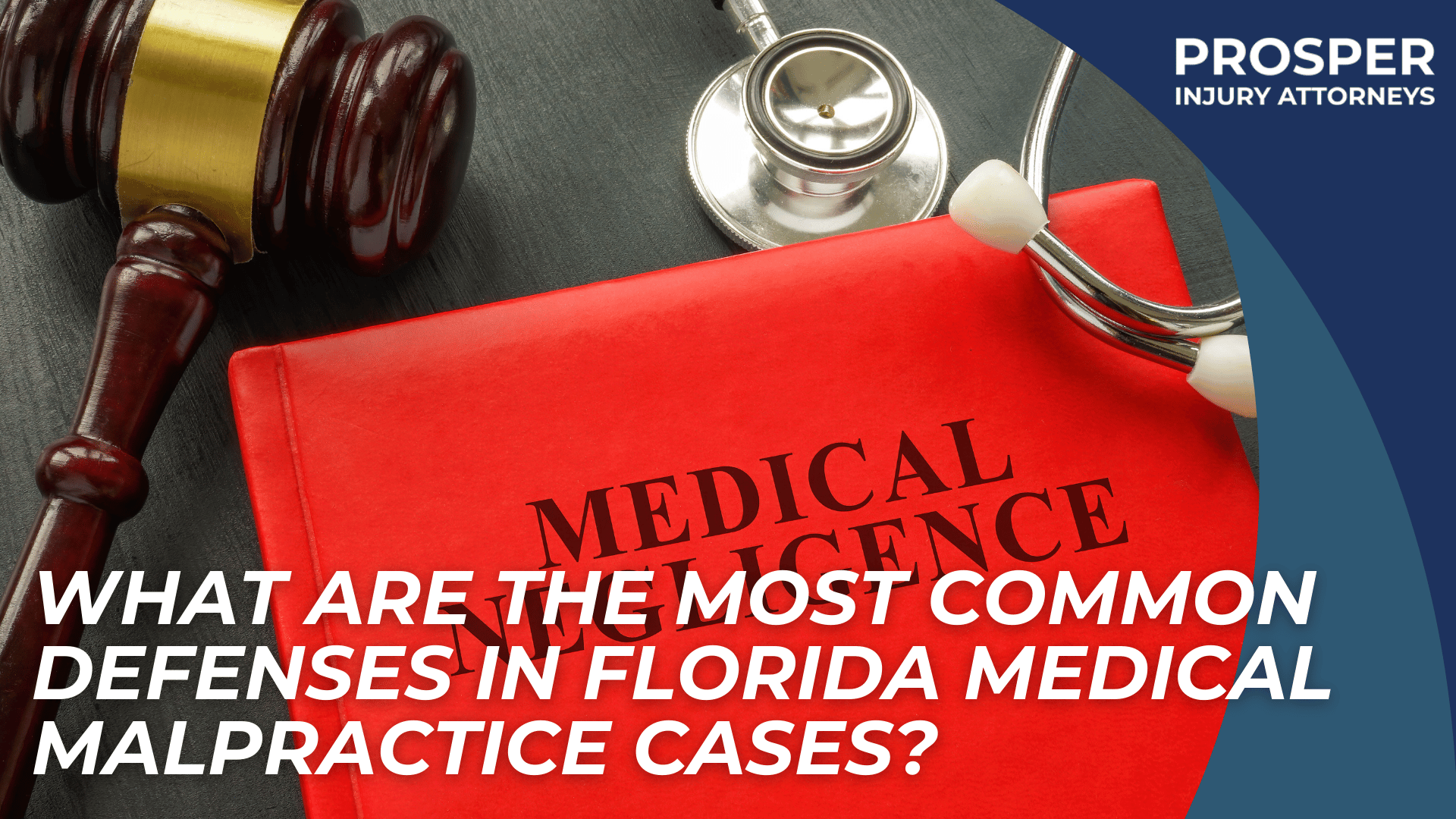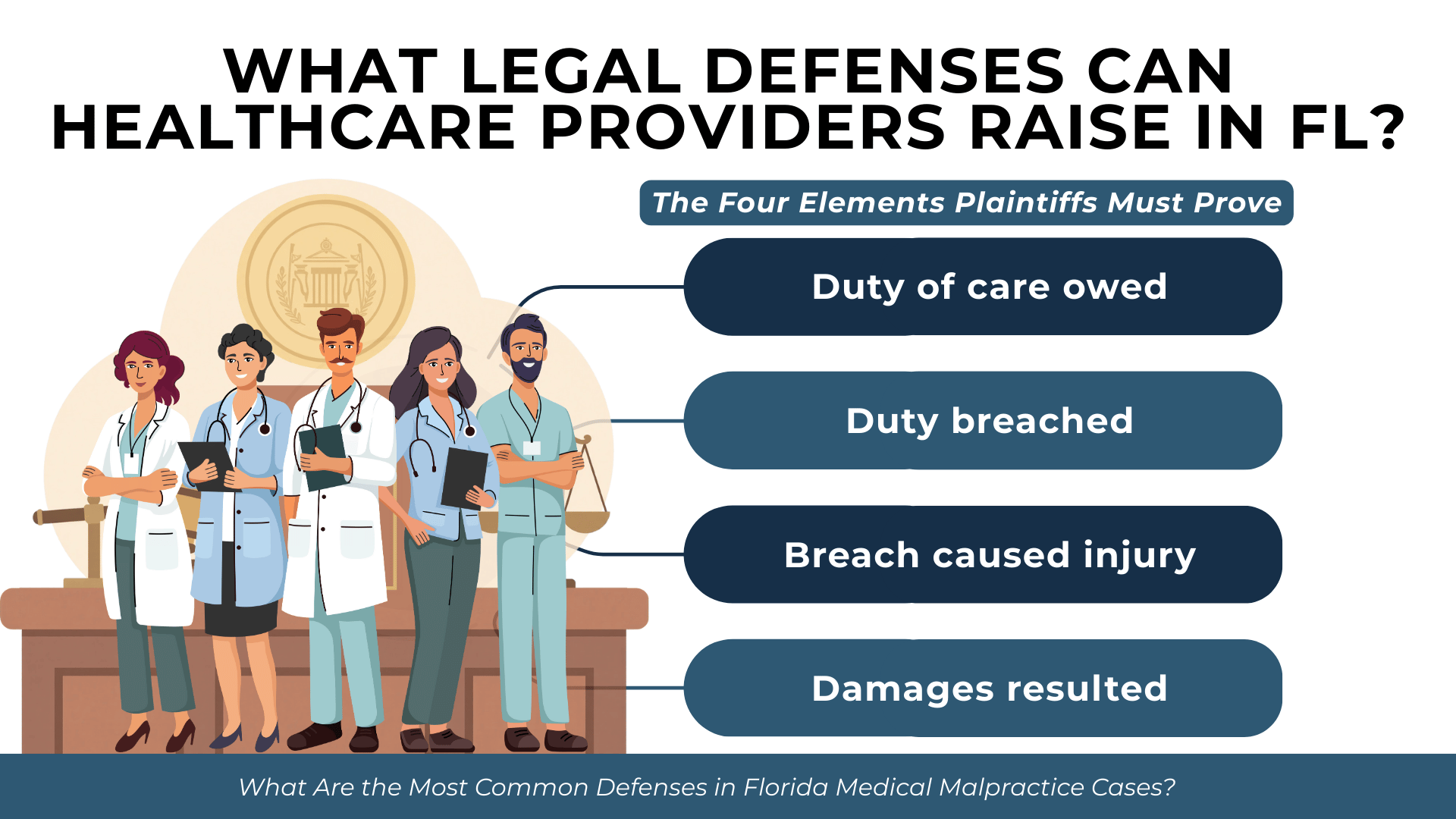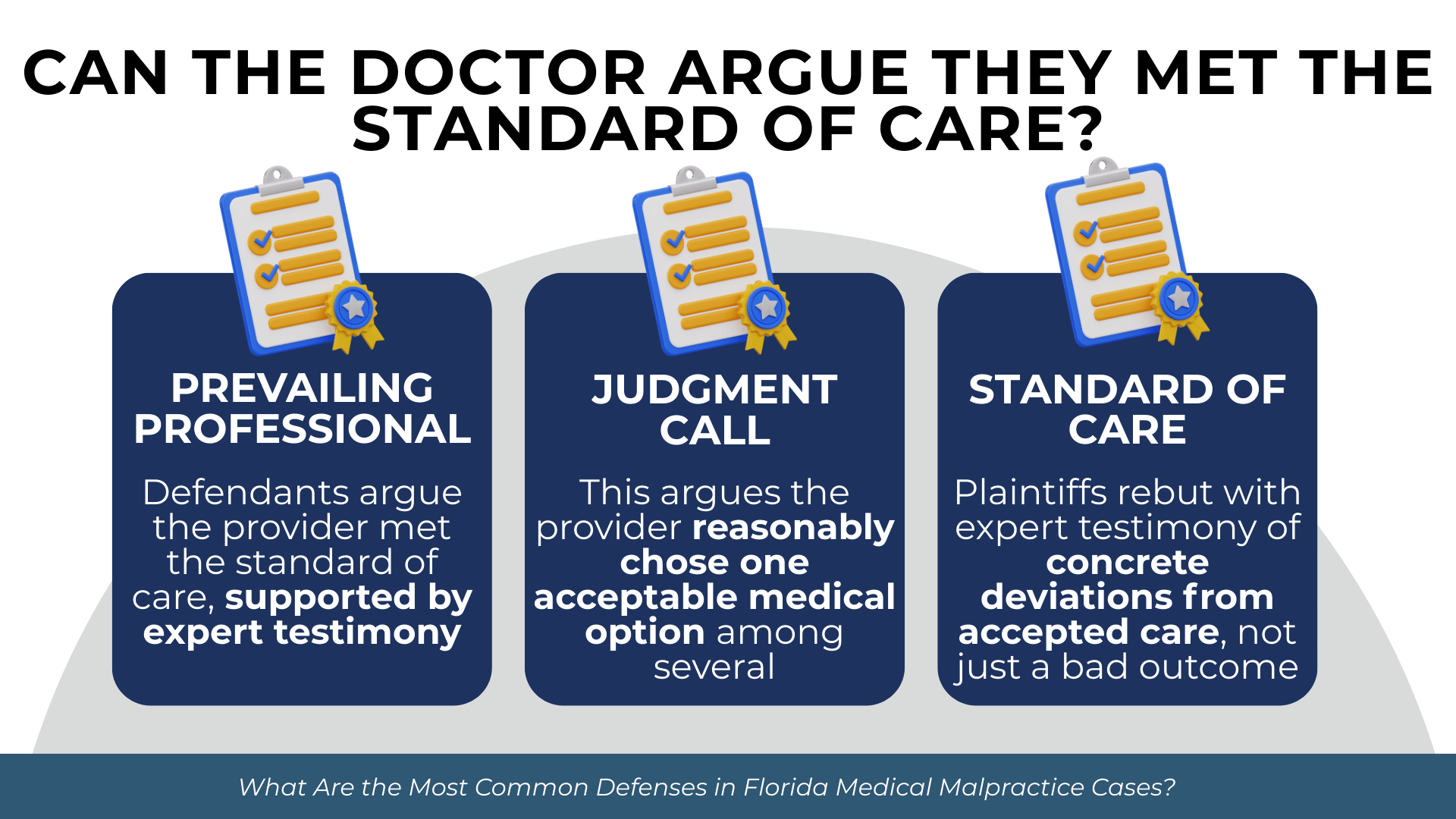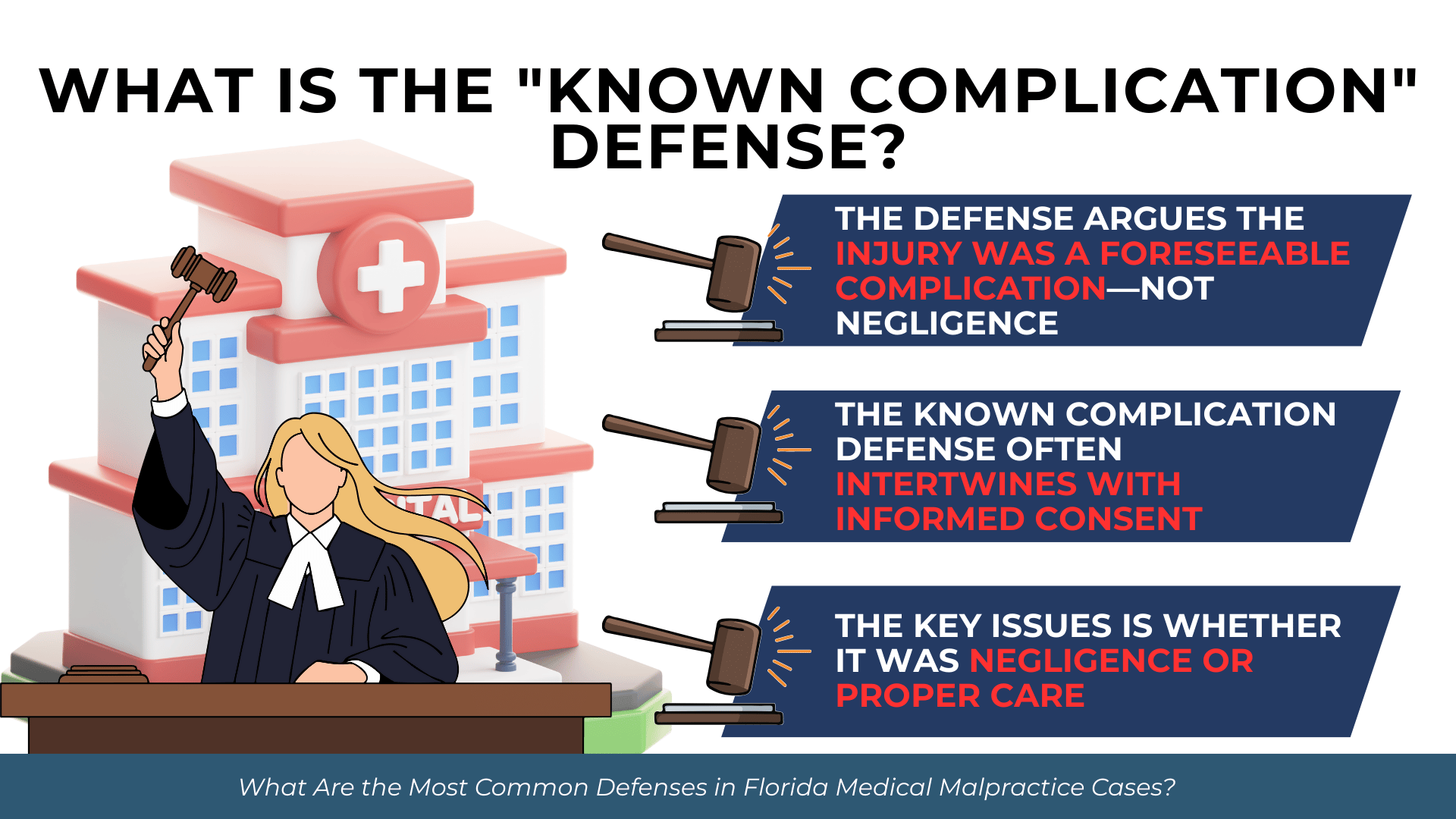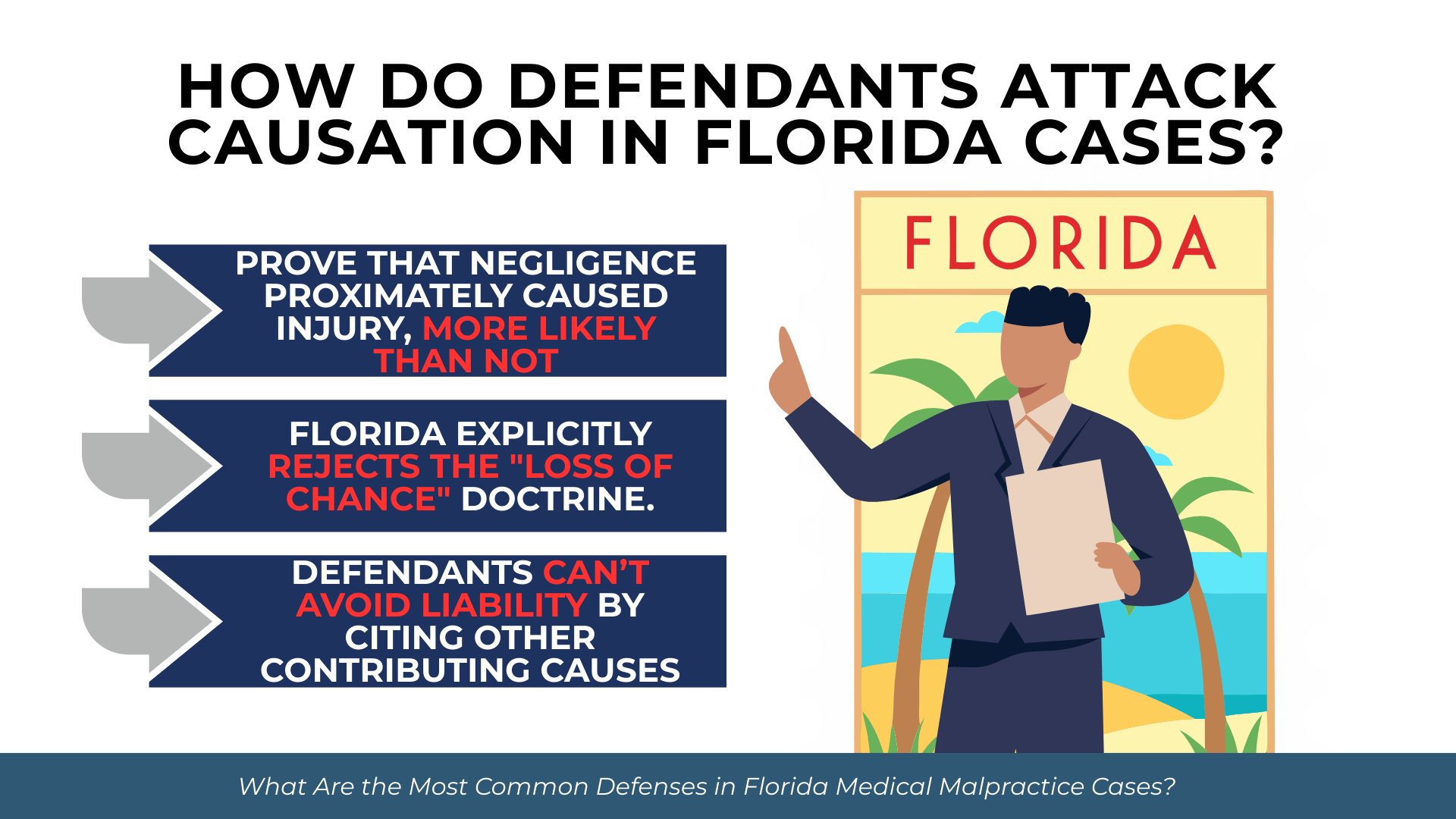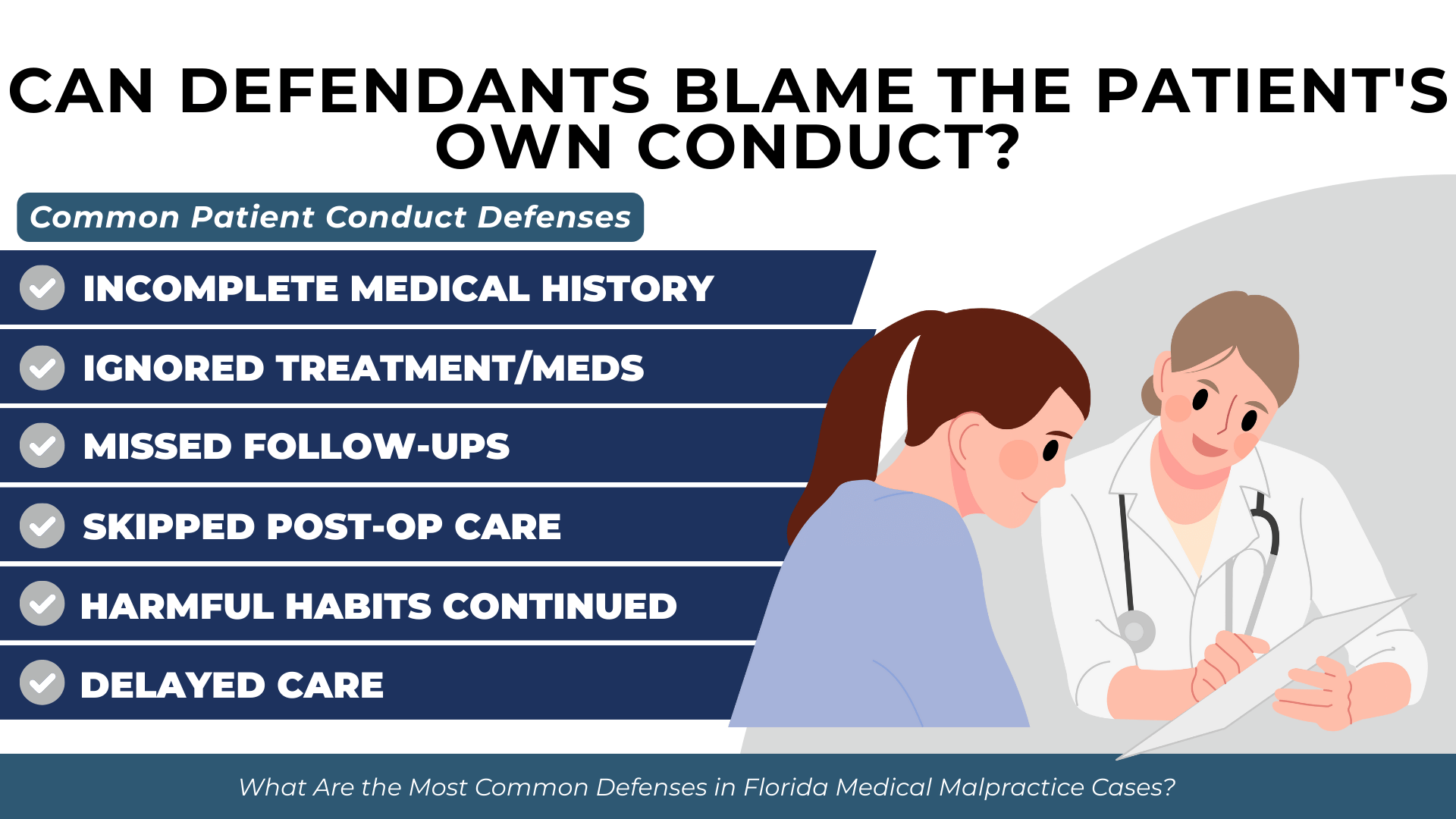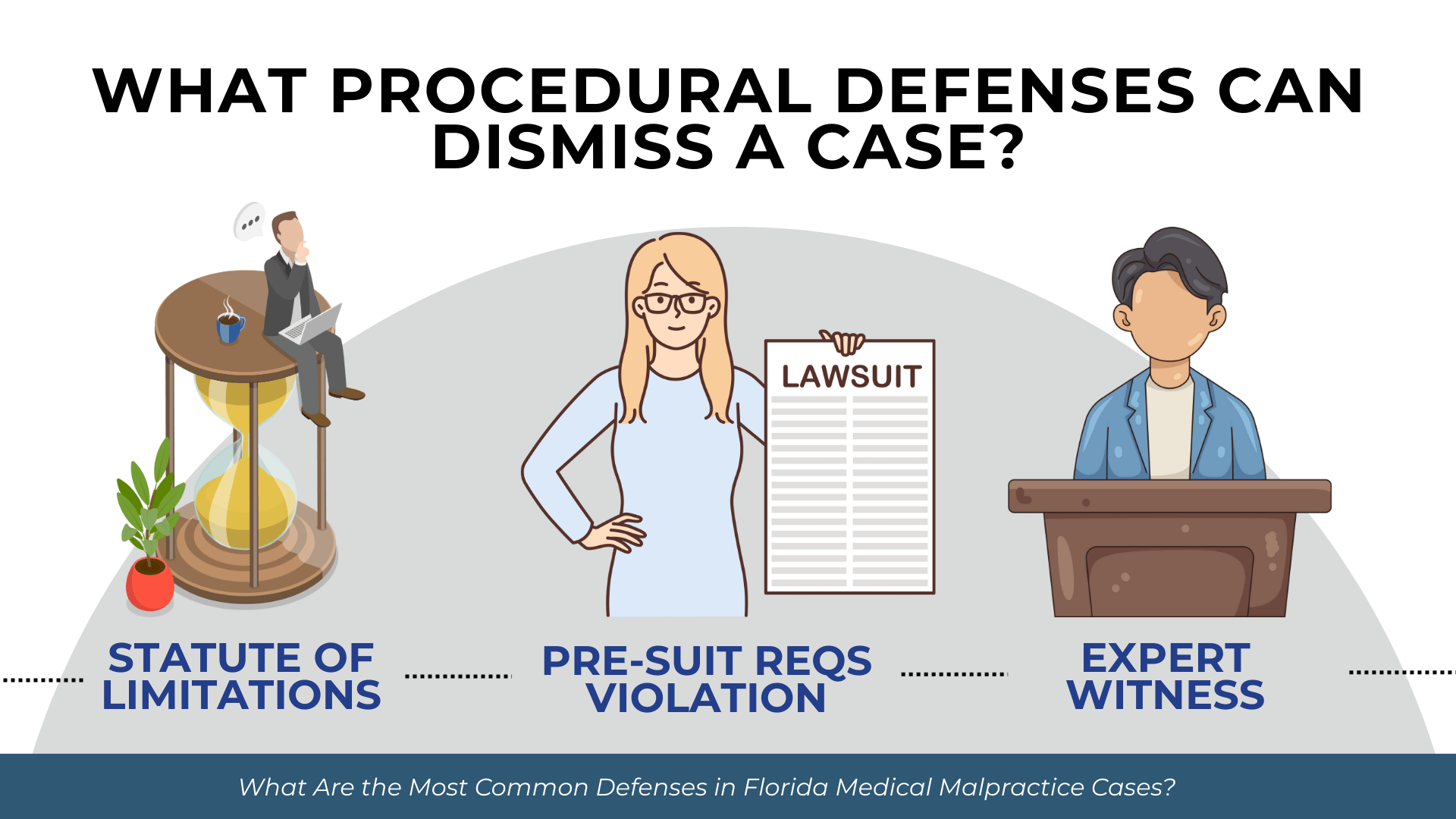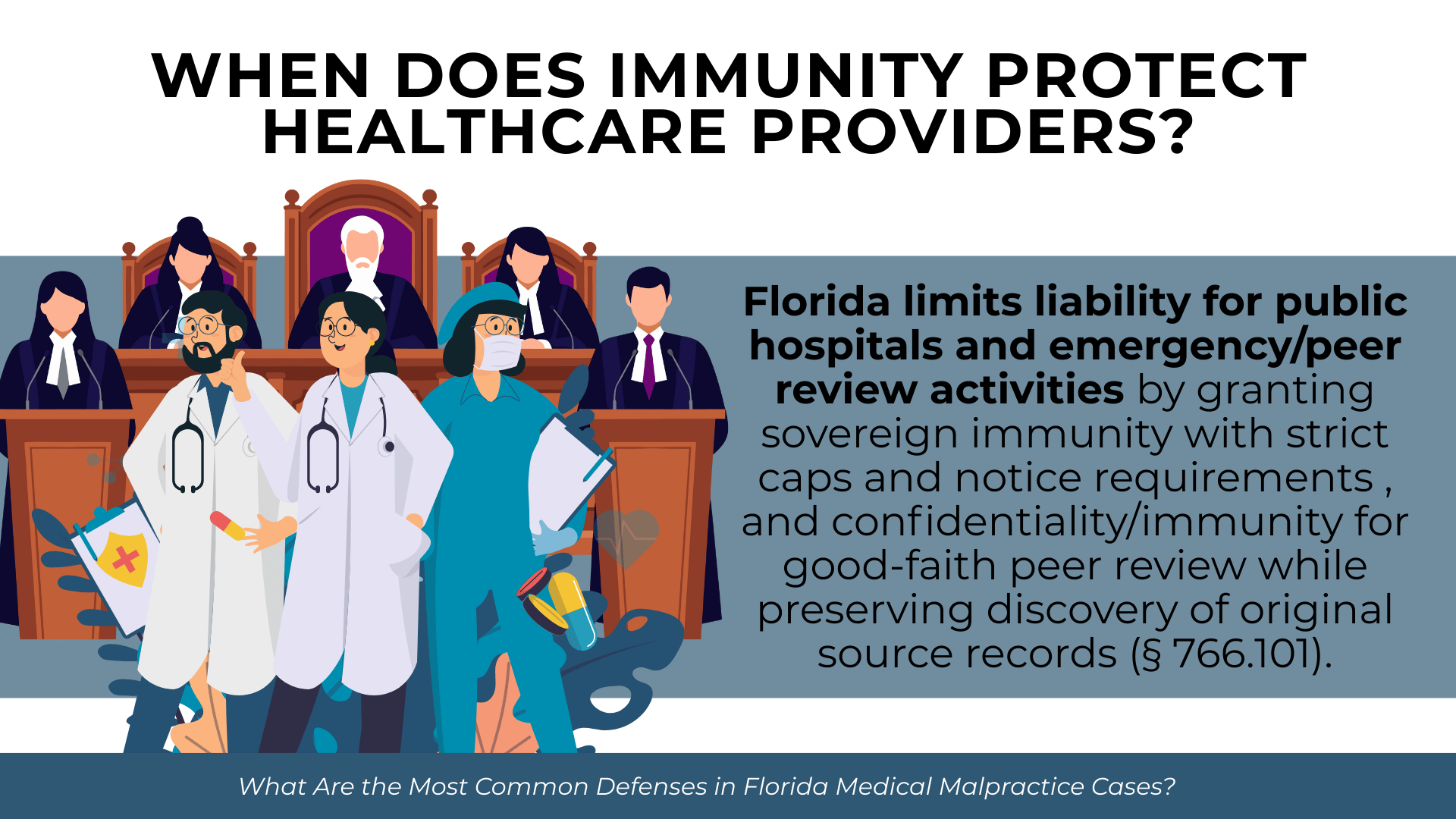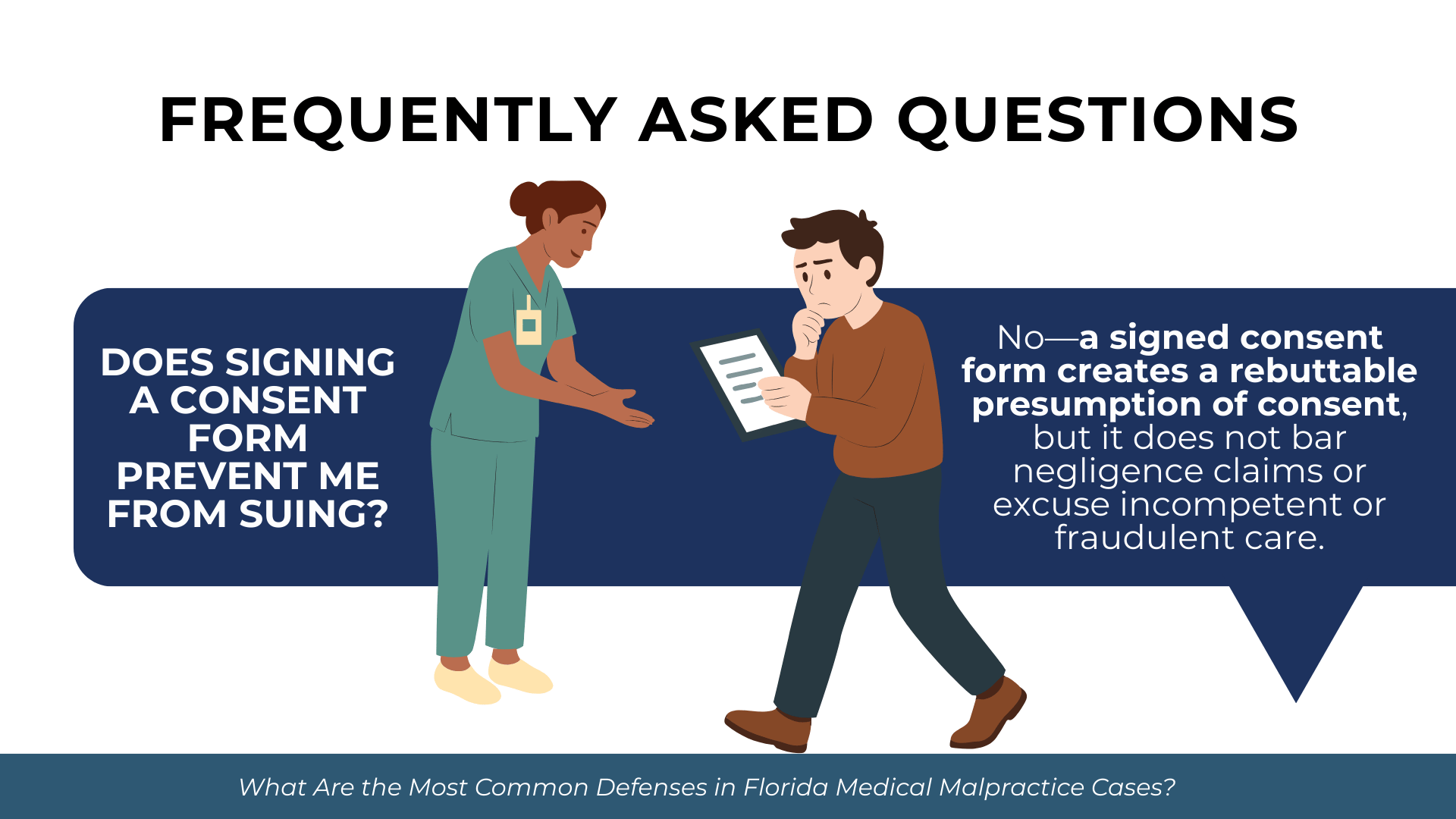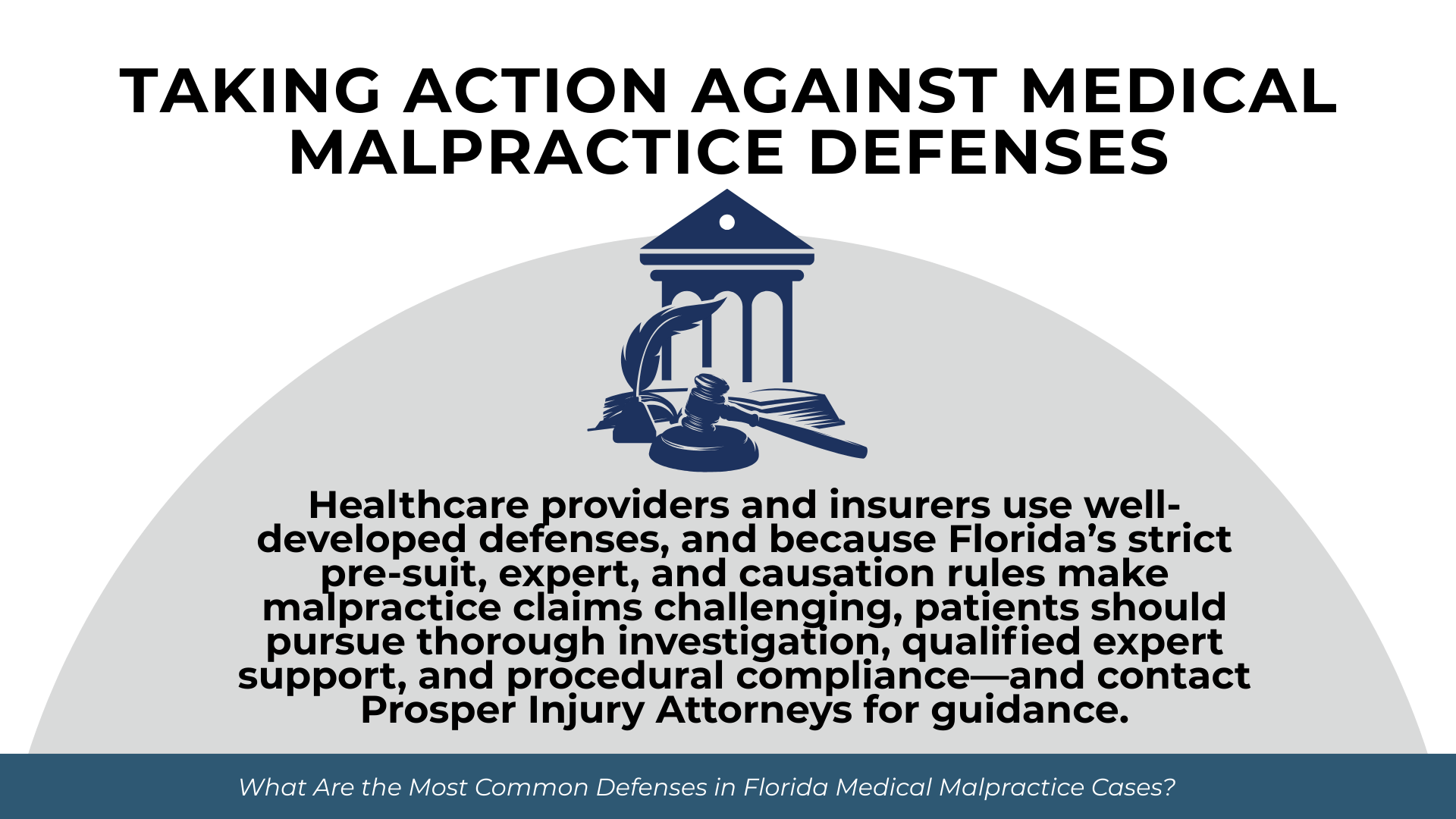When a patient suffers harm from medical negligence, the path to compensation is rarely straightforward. Healthcare providers and their insurers mount aggressive defenses designed to defeat claims or reduce damages. Understanding the most common defenses to medical malpractice cases helps injured patients and their families prepare for the legal challenges ahead.
Florida law creates specific requirements plaintiffs must meet and offers defendants multiple avenues to challenge a claim. From arguing that treatment met professional standards to attacking the timing of a lawsuit, these defense strategies can determine whether a case succeeds or fails.
What Legal Defenses Can Healthcare Providers Raise in Florida?
The Four Elements Plaintiffs Must Prove
Florida medical malpractice claims require proof of four essential elements. A defendant’s strategy typically focuses on undermining one or more of these requirements.
Plaintiffs must establish:
- The healthcare provider owed a duty of care based on the treatment relationship
- The provider breached the prevailing professional standard of care
- The breach was the proximate cause of the patient’s injury under the “more likely than not” standard
- The patient suffered actual damages as a result
Under Fla. Stat. § 766.102, the claimant bears the burden of proving each element by the greater weight of evidence. Defense attorneys scrutinize every element for potential weaknesses.
How Defenses Target Each Element
Defenses fall into two broad categories: substantive defenses that attack the merits of the claim and procedural defenses that seek dismissal on technical grounds.
Substantive defenses argue that the plaintiff cannot prove breach, causation, or damages. A defendant might contend that treatment followed accepted medical practice, that the injury would have occurred regardless of any alleged negligence, or that the patient’s own conduct contributed to the harm.
Procedural defenses focus on the plaintiff’s failure to comply with Florida’s strict pre-suit requirements or filing deadlines. These defenses can result in dismissal before the merits are ever reached.
Why Understanding Defenses Matters Early
Anticipating defense strategies during the pre-suit investigation phase allows plaintiffs to build stronger cases. The mandatory 90-day pre-suit period under Fla. Stat. § 766.106 provides time to gather evidence that addresses likely defenses.
A qualified medical expert reviewing the case early can identify vulnerabilities and help frame the claim to withstand expected challenges. Waiting until after a lawsuit is filed to consider how defendants will respond puts plaintiffs at a disadvantage.
Can the Doctor Argue They Met the Standard of Care?
Call us today at (305) 694-2676 or
contact us online for a free case evaluation.
Hablamos español.


The “Prevailing Professional Standard” Defense
The most common substantive defense argues that the healthcare provider’s treatment met the prevailing professional standard of care. Under Fla. Stat. § 766.102(1), this standard is “that level of care, skill, and treatment which, in light of all relevant surrounding circumstances, is recognized as acceptable and appropriate by reasonably prudent similar health care providers.”
Defendants present expert testimony that the care provided was within the range of what competent practitioners would consider acceptable. Florida largely follows a national professional standard for clinical care, meaning defendants cannot hide behind outdated or substandard local practices.
The defense expert must meet Florida’s strict qualification requirements under Fla. Stat. § 766.102(5)(a). For specialists, the expert must practice in the same specialty and have devoted professional time during the three years immediately preceding the incident to active clinical practice, instruction, or research in that specialty.
Judgment Call and Alternative Treatment Defenses
Even when the outcome is poor, defendants argue that the physician exercised reasonable medical judgment. The “judgment call” defense contends that multiple approaches were medically acceptable and the provider chose one reasonable option among several.
This defense is particularly effective when medical literature supports different treatment protocols. If respected practitioners disagree about the best approach to a condition, a defendant can argue that choosing one accepted method over another does not constitute negligence.
How Plaintiffs Counter Standard of Care Defenses
Plaintiffs overcome standard of care defenses by presenting qualified expert testimony that the defendant’s specific actions deviated from what reasonably prudent providers would recognize as acceptable. The focus must be on concrete deviations—not just a bad outcome.
Strong cases identify specific points where the provider failed to act appropriately: missed diagnostic findings, ignored warning signs, delayed necessary treatment, or failed to communicate critical information. Documentation from medical records often provides the evidence needed to establish these failures.
What Is the “Known Complication” Defense?
When Complications Are Foreseeable Results
One of the most frequently raised defenses argues that the patient’s injury was a known, foreseeable complication of the procedure—not the result of negligence. Under Fla. Stat. § 766.102(2)(a), for affirmative medical interventions, the plaintiff must prove that the injury “was not within the necessary or reasonably foreseeable results of the procedure when performed according to the standard of care.”
This defense acknowledges that medicine carries inherent risks. Surgeries can result in nerve damage, infections, or bleeding even when performed flawlessly. The defense argues that the complication occurred despite—not because of—the care provided.
How Informed Consent Affects This Defense
The known complication defense often intertwines with informed consent. Under Fla. Stat. § 766.103, healthcare providers must ensure that a reasonable patient would have a general understanding of the procedure, medically acceptable alternatives, and substantial risks inherent in the proposed treatment.
If the patient signed a consent form acknowledging specific risks and one of those risks materialized, defendants argue the patient assumed that risk. However, per Public Health Trust of Dade County v. Valcin, 507 So. 2d 596 (Fla. 1987), a written consent form creates only a rebuttable presumption of valid consent—it can be overcome by evidence of fraudulent oral misrepresentations or inadequate explanation.
Distinguishing Complications from Negligence
The critical distinction is whether the complication occurred because of negligent technique or despite proper care. A known complication becomes actionable negligence when:
The provider performed the procedure incorrectly, increasing the risk of the complication. The provider failed to take reasonable steps to prevent the complication. The provider failed to recognize and respond appropriately to the complication when it occurred.
Plaintiffs counter this defense by showing that the specific circumstances of the injury point to substandard care rather than an unavoidable outcome.
How Do Defendants Attack Causation in Florida Cases?
The “More Likely Than Not” Requirement
Causation is often the most contested element. Under Florida law, plaintiffs must establish that the defendant’s negligence was the proximate cause of injury and that this causation is “more likely than not”—meaning greater than 50% probability.
Defendants argue that the patient’s underlying condition, not the alleged negligence, caused the harm. They present expert testimony that the injury would have occurred even with perfect care, or that the chain between the provider’s actions and the patient’s harm is too attenuated.
In Wale v. Barnes, 278 So. 2d 601 (Fla. 1973), the Florida Supreme Court established that plaintiffs must prove the standard of care, breach, and proximate causation of damages. Defense experts often testify that while care may have been imperfect, it did not cause the claimed injury.
Florida’s Rejection of Loss of Chance
Florida explicitly rejects the “loss of chance” doctrine. In Gooding v. University Hospital Building, Inc., 445 So. 2d 1015 (Fla. 1984), the Florida Supreme Court held that a plaintiff cannot recover for a decreased chance of survival if the pre-diagnosis survival rate was 50% or less.
This means defendants in delayed diagnosis cases can defeat liability by showing the patient’s prognosis was already poor before any alleged negligence. If a cancer patient had less than a 50% chance of survival even with timely diagnosis, the defendant argues the delay did not cause the death under Florida law.
This defense is particularly devastating in cancer misdiagnosis cases. According to the Journal of Healthcare Risk Management (2019), missed cancer represents 46% of primary care diagnostic error malpractice claims—yet Florida’s rejection of loss of chance bars recovery when the patient’s survival odds were already unfavorable.
The Substantial Factor Standard
Despite strict causation requirements, defendants cannot escape liability simply by pointing to other contributing causes. In Ruiz v. Tenet Hialeah Healthsystem, Inc., 260 So. 3d 977 (Fla. 2018), the Florida Supreme Court held that the defendant’s negligence need not be the “primary cause” of injury—only a “substantial factor.”
A physician cannot insulate themselves by blaming a subsequent treating physician or other contributing factors. If the original negligence substantially contributed to the harm, liability attaches.
Can Defendants Blame the Patient’s Own Conduct?
Get started with your complimentary case evaluation today;
call us at (305) 694-2676 or reach us online using our
secure contact form.


Comparative Negligence in Medical Malpractice
Florida applies pure comparative negligence to medical malpractice claims. Critically, when Florida enacted tort reform through HB 837 in 2023—which bars recovery for plaintiffs more than 50% at fault in most negligence cases—medical malpractice was explicitly exempted under Fla. Stat. § 768.81(6).
This means a medical malpractice plaintiff can recover damages even if found more than 50% responsible for their own harm, though the recovery is reduced proportionally.
Common Patient Conduct Defenses
Defendants frequently argue that the patient’s own actions contributed to or caused the injury. Common patient conduct defenses include:
- Failure to disclose accurate and complete medical history
- Failure to follow prescribed treatment plans or take medications as directed
- Missing scheduled follow-up appointments
- Non-compliance with post-operative care instructions
- Continuing behaviors (smoking, poor diet, alcohol use) that worsen outcomes
- Delay in seeking treatment when symptoms appeared
Each defense requires evidence that the patient’s specific conduct causally contributed to the injury. Non-compliance unrelated to the claimed injury is irrelevant.
Why Comparative Fault Reduces But Does Not Bar Recovery
Unlike other negligence claims under Florida’s modified comparative fault system, medical malpractice plaintiffs can still recover even if predominantly at fault. A patient found 60% responsible for their injury recovers 40% of damages. A patient found 80% responsible recovers 20%.
This provides meaningful protection for patients whose conditions or circumstances made full compliance difficult. However, defendants aggressively pursue patient conduct evidence during discovery to maximize comparative fault findings.
What Procedural Defenses Can Dismiss a Case?
Statute of Limitations and Statute of Repose
Florida imposes strict time limits on medical malpractice claims. Under Fla. Stat. § 95.11(5)(c), a claim must be filed within two years from when the injury was discovered or should have been discovered with due diligence. An absolute four-year statute of repose bars claims filed more than four years after the incident, regardless of when the injury was discovered.
Under Tanner v. Hartog, 618 So. 2d 177 (Fla. 1993), “discovery” requires knowledge of the injury and a “reasonable possibility that the injury was caused by medical malpractice.” Defendants argue that the plaintiff knew or should have known about potential malpractice earlier than claimed.
The statute of repose is particularly harsh. In Kush v. Lloyd, 616 So. 2d 415 (Fla. 1992), the Florida Supreme Court upheld the four-year repose period even when it was impossible for the plaintiff to discover the injury within that timeframe. Limited exceptions exist for minors (until the child’s 8th birthday) and cases involving fraud or concealment (seven-year outer limit).
Pre-Suit Requirement Violations
Florida’s mandatory pre-suit requirements under Fla. Stat. § 766.106 and § 766.203 create multiple procedural tripwires. Failure to comply can result in dismissal. Required pre-suit elements include:
- Completion of a reasonable investigation before mailing notice of intent
- A verified written medical expert opinion corroborating reasonable grounds to support the claim
- Written notice of intent served by certified mail at least 90 days before filing suit
- List of all known healthcare providers seen for related treatment
- Copies of all medical records relied upon by the expert
- Executed HIPAA authorization form per Fla. Stat. § 766.1065
Defendants scrutinize each element. Under Boyd v. Becker, 627 So. 2d 481 (Fla. 1993), the 90-day tolling period is measured from when notice is received, not when mailed—creating potential timing traps for plaintiffs.
Expert Witness Challenges
Defendants challenge the qualifications of plaintiff’s medical experts under Fla. Stat. § 766.102(5). For specialists, the expert must practice in the same specialty as the defendant—2013 amendments eliminated “similar specialty” as sufficient.
Under Florida’s adoption of the Daubert standard through In re Amendments to the Florida Evidence Code, 278 So. 3d 551 (Fla. 2019), expert testimony must be based on sufficient facts and data, the product of reliable principles and methods, and reliably applied to case facts. Defendants file motions to exclude experts who fail these requirements.
Per 2023 rule amendments to Fla. R. App. P. 9.130(a)(3), denial of a motion to dismiss based on expert qualification grounds is immediately appealable—allowing defendants to challenge experts before trial.
When Does Immunity Protect Healthcare Providers?
Sovereign Immunity for Government Hospitals
Public hospitals—including county hospitals, teaching hospitals affiliated with public universities, and special taxing district hospitals—enjoy sovereign immunity protections under Fla. Stat. § 768.28. This creates significant limitations on recovery:
- Maximum recovery of $200,000 per person
- Maximum recovery of $300,000 per incident (aggregate for all claimants)
- No punitive damages
- No prejudgment interest
- Claims exceeding caps require a claims bill through the Florida Legislature
Under Levine v. Dade County School Board, 442 So. 2d 210 (Fla. 1983), the notice requirement under § 768.28(6) is a mandatory condition precedent to suit. Written notice must be received (not just mailed) by the agency and the Department of Financial Services within three years of accrual.
Good Samaritan and Emergency Department Protections
Fla. Stat. § 768.13 provides immunity for persons rendering gratuitous emergency care. For hospital emergency departments and ER physicians, a heightened standard applies—plaintiffs must prove “reckless disregard” rather than ordinary negligence.
“Reckless disregard” means conduct creating an unreasonable risk “substantially greater than that which is necessary to make the conduct negligent.” This higher burden makes emergency department claims more difficult to prove.
The protection extends only while the patient is receiving emergency care. Once stabilized, standard negligence principles apply.
Peer Review Immunity
Florida protects medical peer review activities under Fla. Stat. § 766.101. Committee members acting in good faith are immune from liability, and peer review records are confidential and not discoverable.
However, as established in Holly v. Auld, 450 So. 2d 217 (Fla. 1984), original source documents remain discoverable—only the committee’s deliberations and conclusions are protected. Witnesses can testify to personal knowledge but cannot reveal committee discussions.
Frequently Asked Questions
Can a doctor avoid liability by saying they followed hospital policy?
Following hospital policy does not automatically establish that care met the professional standard. The relevant question is whether the care was acceptable and appropriate by reasonably prudent similar health care providers under Fla. Stat. § 766.102(1). If hospital policy falls below that standard, compliance with policy is not a defense.
What happens if the defense hires an expert who disagrees with my expert?
Conflicting expert testimony is common in medical malpractice cases. The jury weighs the credibility, qualifications, and reasoning of each expert. Strong cases present clear, documented deviations from standard care that are difficult for defense experts to explain away. The quality of expert testimony often determines outcomes.
Does signing a consent form prevent me from suing?
No. A signed consent form creates a rebuttable presumption of valid consent under Fla. Stat. § 766.103(4), but it does not immunize providers from negligence claims. Consent addresses whether the patient understood the risks—not whether the provider performed the procedure competently. Additionally, consent obtained through fraudulent misrepresentation or inadequate explanation can be challenged.
Can I still recover damages if I missed follow-up appointments?
Yes, though your recovery may be reduced. Florida’s pure comparative negligence system allows recovery even when the patient shares fault. However, the missed appointments must be causally connected to your injury. If your failure to follow up contributed to a worsened outcome, the jury may reduce your damages proportionally.
How long do I have to file a medical malpractice lawsuit in Florida?
Florida imposes a two-year statute of limitations from discovery of the injury and a four-year statute of repose from the date of the incident under Fla. Stat. § 95.11(5)(c). The mandatory 90-day pre-suit investigation period tolls these deadlines. Limited exceptions apply for minors and cases involving fraud or concealment.
Taking Action Against Medical Malpractice Defenses
Healthcare providers and their insurers have developed sophisticated defense strategies refined over decades of litigation. Understanding these defenses—from standard of care arguments to procedural challenges—helps patients and families evaluate the strength of potential claims and prepare for the obstacles ahead.
Florida’s strict pre-suit requirements, expert witness standards, and causation rules create genuine challenges for plaintiffs. Thorough pre-suit investigation, qualified expert testimony, and attention to procedural requirements are essential to overcoming common defenses.
If you have questions about a potential medical malpractice claim and the defenses you might face, contact Prosper Injury Attorneys to discuss your situation.

